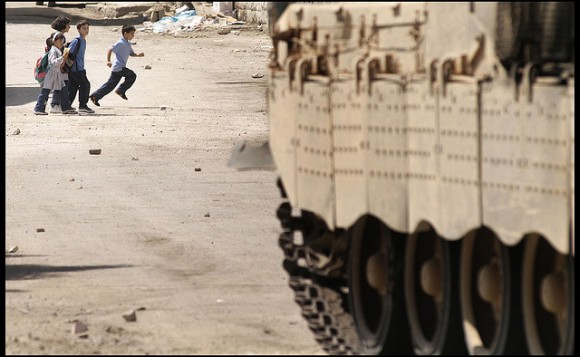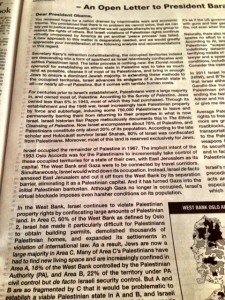This evening I gave the following remarks in the second of two special convention sessions on the boycott of Israeli academic institutions held by the Modern Language Association’s Delegate Assembly Organizing Committee as part of the association’s process of considering a resolution on boycott that could come at next year’s convention. The four speakers in each session, two pro-boycott and two anti-boycott, were limited to seven minutes each, after which questions were posed to the speakers from the audience. I will refrain from characterizing the arguments of the anti-boycott side in my session but to mention that I was asked if I agreed “Muslims are terrorists.” I said no, they’re not—to say they are is Islamophobic. And that was the tip of the iceberg of the anti side’s rhetoric…
I first want to acknowledge that we’re on unceded Indigenous people’s land here in Austin.
This past summer I was in South Africa doing research for my dissertation on criminalization, cultural representations of crime, and colonial and postcolonial social relations. While there, I met with organizers of the boycott, divestment, and sanctions movement, BDS for short, including current students and recent graduates of the University of Johannesburg, the University of Witwatersrand, and the University of Pretoria as well as members of Jewish Voices for a Just Peace, the South African analog to the U.S.-based Jewish Voice for Peace. I want to emphasize these two organizations at the outset of my remarks, since one of the popular criticisms of BDS, including the boycott of Israeli academic institutions, is that somehow it’s anti-Semitic, despite the countless Jewish-identified groups and people who are engaged in the effort.
At my meeting with BDS organizers in Johannesburg, I was asked why I participate in Palestinian solidarity and why I myself am engaged in BDS efforts, both at the City University of New York and at the MLA. It was, and is, a good question. I answered then and I say now that I’m committed to BDS and the boycott of Israeli academic institutions because Palestinians, in the midst of the unceasing occupation and colonial settlement of their land by the Israeli state, have asked the world to help them break this siege through the methods of BDS. Although opponents of these methods continue to try to dismiss this fact—that the force of this collective Palestinian call has no force at all—it is indeed a fact: as much a fact as the South African call for BDS throughout the 1960s, ’70s, and ’80s that played a central role in ending apartheid there.
This is how global-solidarity movements work: a community asks the world to support them in their struggle for self-determination, and the world, ideally, responds. And this is why, for instance, Palestinians under occupation and facing continual inroads by Israeli settlers, have responded to Black Lives Matter organizers here in the U.S. with robust displays of support. Indeed, the links between the black liberation movement in the States and the Palestinian liberation movement in occupied Palestine go back decades, as do links between the Palestinian struggle and many other struggles for self-determination the world over.
This is another reason I support academic boycott: as both a student and beneficiary of settler colonialism in the U.S. and its related structures of white supremacy, heteropatriarchy, and imperialism, and one who’s tracing these operations globally in my dissertation research, I consider it my ethical obligation to not just oppose settler colonialism—whether here in North America by the U.S., Canadian, and Mexican governments or in Palestine by the state of Israel—but to work to dismantle it as well.
And that’s what we can do, as MLA members, by endorsing the boycott of Israeli academic institutions: contribute to the dialogue within Israel and internationally on ending the occupation and colonial settlement of Palestine. Indeed, as much as BDS is an intervention against the Israeli state’s unjust policies concerning Palestine and Palestinians, it’s also an intervention against the support of those policies by governments and institutions around the world. So while BDS, in one way, is meant to spur Israelis to oppose their own government’s policies in response to growing global pressure to do so, in another way BDS is meant to spur non-Israelis to oppose our own respective governments’ support of those same policies.
This dialogue must necessarily extend to Israeli academic institutions, which, like our own academic institutions, have manifold connections to the state, including specific links to the occupation and settlement of Palestine, well-documented by independent sources. But in the remainder of my remarks I want to address the educational situation in Palestine.
So much of the debate in the U.S. over the boycott of Israeli academic institutions revolves around the academic freedom of U.S.- and Israeli-based academics, even though an institutional boycott would not constrain their academic freedom. Meanwhile, Palestinians in the West Bank and Gaza face severe restrictions on both their freedom and their academics as a direct result of occupation and settlement.
These restrictions were brought home for me when I met with students visiting from Birzeit University in the West Bank last academic year as part of the Right to Education tour, another example of dialogue. The students spoke of their difficulties in even getting to class because of the routine obstacles posed by the Israeli-security apparatus, apartheid segregation, and settler violence—that is, when classes weren’t cancelled outright because schools were shut down for Israeli military operations in the area or to quell academic resistance. Indeed, in a fresh-from-the-headlines example, sections of the West Bank city of Hebron have been closed since November by the Israeli military and residents have had to file for “special permits to cross through the 18 military checkpoints in the city center.” Can you imagine what that must be like?
As one of the organizers who helped bring the Birzeit students to the States, Kristian Davis Bailey, has written, “everyone must consider academic freedom in its fuller context. Education is a fundamental human right….We must protect it at all levels. So even when the academy or political elite do not agree with the methods of BDS, they have been presented with facts and with a call from a suffering people to do something. The question is no longer whether or when to act, but how will we respond now?” (Against Apartheid: The Case for Boycotting Israeli Universities 157-158)
I hope, as educators and MLA members, we can all take heart and answer the call Palestinians have made to us by endorsing academic boycott—and sooner, rather than later. Thank you.



